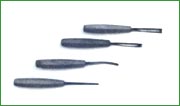First let me start by stating a difference in japanese bonsai tools and chinese bonsai tools. Chinese tools are more cost affordable but often built of lesser quality. Japanese tools cost more, and often comes in various grade. You usually find novice, intermediate, Professionnal. All graded at different price from lowest to highest. Then, you have the stainless steel tools, wich are the summum. They are often professionnal grade but rust-proof.
As a beginner, If you want to try bonsai, you can start with chinese bonsai tools, since they dont cost alot, but once you will have used chinese tools, and if you get to try a japanese pair of pliers of cutter, even the novice one, you'll notice the quality difference and will want to only use japanese bonsai tools in the future. So, novice japanese tools are ok for a beginner ? You bet. Once you'll get more serious about bonsai, you can start to upgrade your bonsai tool kit.
Pointed nose shears
Pointed nose shears with a spring between handles.For small branch and root trimming.
Pointed nose shears with slip-through looped handle
Pointed nose shears with slip-through looped handle, also for trimming small branches and roots.
Small trimmer with slim handle and finger control
Small trimmer with slim handle and finger control. For trimming twigs, old flower buds, old berries or for leaf cutting. (HAGARI)
KUIKIRI trimmer
KUIKIRI trimmer is designed in a special style to cut a branch or root clean without leaving a knob. It makes a concave cut which promotes faster healing. Do not use for twig trimming.
Large KUIKIRI trimmer
Large KUIKIRI trimmer is used to cut a large branch, root or knob.
Folding saw small
Folding type saw is used to saw a branch, root or trunk that cannot be cut with other tools.
Folding saw large
Folding type saw. For sawing large roots or branches.
Hand pruner
Hand pruner for cutting large branches or roots.
Pocket knife
Pocket knife is handy in many ways, which includes grafting, budding, etc.
Double jointed wire cutter
Double jointed wire cutter, so called bolt cutter, for extremely large size wire.
Large straight pointed wire cutter
Large straight pointed wire cutter. Used for cutting both small and large size wires.
Small straight pointed wire cutter
Small straight pointed wire cutter. Used for small size wire. This is designed with a long handle, and has good leverage. Made in Japan.
Straight pointed wire cutter
Straight pointed wire cutter. Made in U.S.A.
Scissor-shaped small wire cutter. Compact so that it can remain in the hand while rewiring small branches. Pointed nose pliers Pointed nose pliers for bending, twisting or removing strong wire. This type only the points are touching. Made in Japan. Pointed nose pliers Pointed nose pliers with beak completely touching. Made in U.S.A. JIN maker pliers JIN maker pliers for branch and trunk. Levers Two sizes of levers for use when a trunk or large branch is hard to bend by hand alone. Bamboo chopsticks Bamboo chopsticks with ends pointed, for removing the soil when transplanting or placing the soil later. Fiber glass stick Fiber glass stick, same purpose as Bamboo chopsticks. KUMADE KUMADE. Bear-claw shaped scratcher with a spatula end for removing the soil and pressing after transplanting. Hand hook Hand hook for removing the soil and combing tight roots when transplanting. Trowel Trowel for pressing down soil ad moss after transplanting, especially around the edge of pot. Use straight edge for straight lined pot, and curved side for round or oval shaped pot. Small hand broom Small hand broom or brush to smooth off the surface soil after transplanting. Tweezer Tweezer for picking dead leaves, sticky needles, pulling weeds or catching insects from a tree. Spatula for removing or pressing soil. Small scythe Small scythe, used to loosen soil around edge of pot. Turntable Turntable with stopper. Used mostly when shaping or transplanting large size trees. Must have stopper so that table will be stable while working. Triangle wooden block Triangle wooden block, 6 or 10 inches long. For setting the angle or position of the tree by inserting under roots or pot. Tin shears Tin shears for cutting screen. Do not use branch trimmer for cutting screens. Tin shears Tin shears for opening tin or plastic containers.Do not use to cut branches. Sprinkling can Sprinkling can with fine rose for watering. Hose Sprinkling hose with a fine nozzle attached. Water storing container Water storing container, large pottery or wooden barrel. Sieves Screen sieves for selecting the sizes of sand, soil and mulch. Screens 1/2 inch, 1/4 inch, 1/8 inch, and 1/16 inch mesh screens. Carving tools Chisels and mallet Electric drills MiscellaneousHammer with pointed end, punch, lead (fishing sinker with hole) and wires for rock- clinging style (ISHIZUKE). Moisture gauge Tool box with extra trays |













































